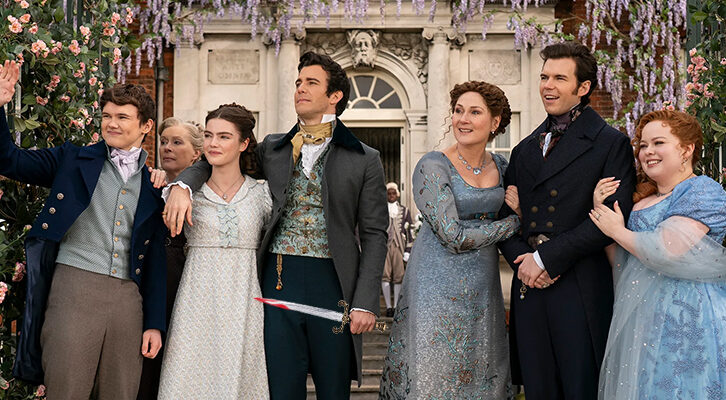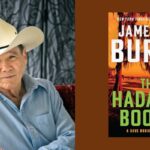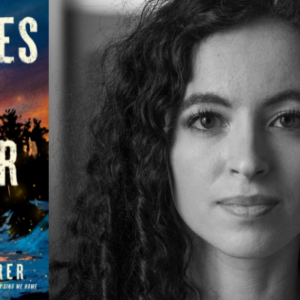
William Gass on 12 of the Most Important Books in His Life
From Literary Criticism to "Books to go to bed with"
I began to mull over the nature of literary influence (mull is not a word indicating any kind of progress) when I was considering opening A Temple of Texts (New York: Alfred A. Knopf, 2006) with a pamphlet that the International Writers’ Center and the Washington University Library published to celebrate the center’s birth in 1990. We arranged an exhibit of books and manuscript materials to accompany a list of 50 works that I was prepared to say had influenced my own work. Our aim was modest: merely to get our endeavor noticed on a busy campus. I dashed my mini-catalogue off in a few days as books called out their authors’ names to me, and I could have gone on I don’t know how much further. To my dismay, this list was immediately taken to be a roll call of “best books,” an activity I have no sympathy for, and certainly did not apply in this case, because not all great achievements are influential, or at least not on everybody. So Proust was not there, or Dante or Goethe or Sophocles, either. Awe often effaces every other effect. I more fully examine the concept of influence in my essay titled “Influence” in A Temple of Texts.
![]()
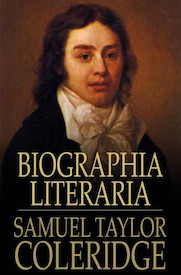
Samuel Taylor Coleridge’s Biographia Literaria
I am not the only reader who considers the Biographia the greatest work of literary criticism ever—even if Coleridge plagiarizes from the German idealists. I was lucky enough to study it under the gentle and wise guidance of Professor M. H. Abrams. The seminar was built on one directive: we would not only read the Biographia but would (by sharing and parceling out the labor) read every book it quotes from, mentions, or alludes to. The result was, in miniature, a university education. In researching my papers for the course, I also learned never to rely on secondary sources, but to trust only primary ones—a teaching that leads directly to this ideal: write so as to become primary.
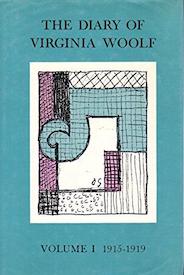
Virginia Woolf’s Diaries
Pepys, everybody knows about. The lover of diaries, however, is familiar with them all, from André Gide’s famous work to Emanuel Carnevali’s more obscure entries. Actually, Gide kept a journal, while Cesare Pavese kept a diary, and the difference between a notebook of the sort Henry James tended, which was his workshop, the record of activities that makes up the diary, and the kind of “thought-clock” the journal resembles is an interesting one. Loneliness is the diary keeper’s lover. It is not narcissism that takes them to their desk every day. And who “keeps” whom, after all? The diary is demanding; it imposes its routine; it must be “chored” the way one must milk a cow; and it alters your attitude toward life, which is lived, finally, only in order that it may make its way to the private page. It is a pity Virginia’s could not have held her head above water a while longer.
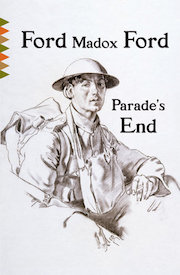
Ford Madox Ford’s Parade’s End (the Tietjens tetralogy)
Ford is, for me, a much-maligned, misunderstood, and heroic figure, the author of at least three great works: the Fifth Queen trilogy, the masterful epistemological novel The Good Soldier, and his Tietjens books. He was a wonderful memoirist, too, a great editor, and a true friend of literature, “a man mad,” as he said, “about writing.” About 15 years ago [now nearer 30], talking to a group of literature students at the University of Leeds, I asked them their opinion of Ford, and fewer than a handful had ever heard of him. No wonder the empire fell into decay. Largely through the efforts of Sondra Stang, Ford’s reputation has grown since then, but he is still not accorded the position he deserves. Some Do Not . . . , the first volume of the four, was written in 1924, the year of my birth. I still think it is the most beautiful love story in our language. It is a modern love story, with this astonishing difference: everything is treated with profound irony except the love itself.
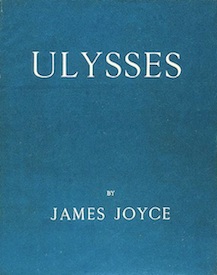
James Joyce’s Ulysses
When I was in high school, I tried to smuggle a copy of this once-banned and still “dirty” book past the resolutely puritanical eyes of my hometown librarian. No luck. I’d have placed a curse upon her ovaries had I known where ovaries were. But everything works out for the best, as Dr. Pangloss says. I was then too young for Ulysses. When I did read it, I was not struck dumb, as I should have been. Rather, I was flung into a fit of imitation. Like Dante, like Milton, like Proust, like Faulkner, like García Márquez, Joyce is too towering to imitate. It would be years before I could escape his grasp, and I still avoid Ulysses when I am working. The only words that dare follow “Stately, plump Buck Mulligan . . .” are Joyce’s.
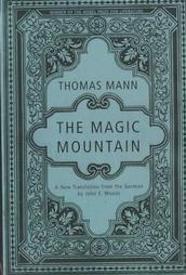
Thomas Mann’s The Magic Mountain
Lifetimes don’t last long enough for us to have more than two or three vocational revelations. Perhaps I was 15 when I first read “Disorder and Early Sorrow,” but I still remember part of my emotion. I desperately wanted to be “like Mann.” It was not just that I wanted to write as powerfully or as profoundly, or even that I wanted to have his art or his mind. I remember trying to understand my desire for that likeness, and it was only later that I decided what my feeling really was: I wanted to be like that story—to have that measured depth, that subtlety, that sense—yes—of its own importance, and even to be its problems, endure its theme. And later I would devour everything he wrote, especially Death in Venice. Doctor Faustus is an equally admirable novel, I think; but The Magic Mountain is a work I have read more often than any other novel, and one I studied carefully when young, and began to see as a complex textual world. I loved the fact that I could read its brief passages of schoolboy French. At St. Louis’s yearly Book Fair (the region’s most important cultural event), I found a few years back a nice copy of Joseph in Egypt. On the flyleaf, in Mann’s hand, was a thank-you note to his St. Louis hostess. The book cost me a buck.
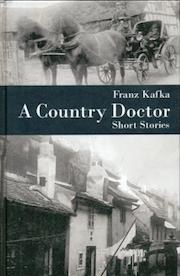
Franz Kafka’s “A Country Doctor” and Other Stories
Kafka was for me a perfect example of “getting to the party late.” By the time I arrived, I had heard of Kafka for several decades; I had read his imitators, and his critics. I had played with his angst as if it were a football. I did not expect to be impressed (something had held me from him), though impressed I was—mightily. But he would not be “an influence.” Then, in the middle of Kafka—a Kafka I had begun to teach—I found “A Country Doctor,” a mysterious and extraordinary prose lyric, a Kafka in a Kafka. And suddenly, all of Kafka grew more luminous and impenetrable at the same time. Kafka is my next writing project. If I can get to him. [I never did.] I don’t play with his angst anymore—the game is no longer a game. He is a great letter writer, a great diarist, too.
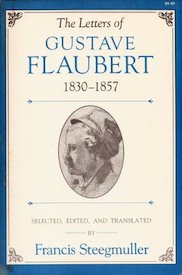
Gustave Flaubert’s Letters
Here I learned—and learned—and learned. My letters. I did not learn how to write. You learn that by writing. After you have read much. I learned what and how to think about writing. I learned what literary ideals were and why they were important. I became only a third-grade fanatic, but every advancement helped. I also got to understand something of my own anger by studying Flaubert’s rage. I must say I trust hatred more than love. It is frequently constructive, despite the propaganda to the contrary; it is less frequently practiced by hypocrites; it is more clearly understood; it is painfully purchased and therefore often earned; and its objects sometimes even deserve their hoped-for fate. If you love the good, you have to hate evil. I cannot imagine a love so puerile and thin and weak-kneed it cannot rage. But hate killed Flaubert, I think, and it didn’t do Céline many favors. If I had any advice to give a young writer (and I haven’t), I would suggest an enraptured reading of these letters. One ought not to feel about women as Flaubert did—he could be coarse and brutal—but he will teach you how to treat a page. Maybe I go too far if I say that every mot is juste, but certainly every other one is.
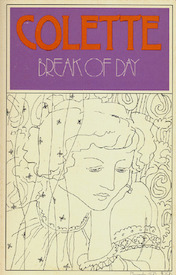
Colette’s Break of Day
Books to go to bed with; books better than most breasts; books that feel like silk sheets someone has spilled crumbs on, for they are not so totally smooth as not to scratch. Adoration is the right word if spoken with the right accent.
Colette was a heroine, too, who threw off the bribing bangles of her captors, dared to kiss other girls in public, or to appear nude (but so motionless, the tableau might not be living). Works in which the juice runs through your closing teeth. And wise, or, maybe, shrewd. Observant not as a god is, but as an adolescent looking on love, and later like a whore looking on lovelessness and age. Semiautobiographical the way one is semidressed. Never breathless as a schoolgirl, though, or like this prose, disjointed, but long and slow and generous and fine as the line of the leg.
Regarde, she commanded. And in Chéri, she looked at age as it comes to those whose means of life depend on their physical attractions, or, at least, on the promises of the body. Break of Day is the classic menopause book. Resilient and resigned, yet rich in resolution, Break of Day does not translate La Naissance du Jour very well, when what is meant is something like the dawning of the end. American students, I have discovered to my sorrow, do not take kindly to Colette. Is it because, though they exercise their bodies, they never exercise their senses? Or because, though they know a bit about sex, they prefer not to know about sensuality?
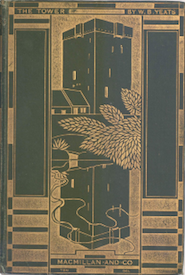
William Butler Yeats’ The Tower
Wouldn’t we all like to grow old full of lust and rage, as Yeats did? Wouldn’t we all like to have a late phase that would unlace the stays, and unwrap everything, and lay it bare for our wise, ripe, appreciative, and lascivious gaze? The Tower is not a volume of the late poems. Those I admire even more than the masterpieces here, but this is the book that did its worst and best with me. Poetry has been a beleaguered castle on a cliff for a long time, and my castle had four towers: Yeats, Valéry, Rilke, and Wallace Stevens. Their period produced some of the greatest lyric poetry our European culture has ever seen—perhaps its last gasp. These poets understood that poetry was a calling—and to consciousness a complete one. Yeats wanted to be a seer, and if, as it happened, there was nothing to see, he would invent it, not simply for himself but for everybody else, too. He sets Byzantium down in Sligo. Yeats invested his language with an original richness, as if every word were a suitcase he would open, rummage around in, and carefully repack, slipping a few extras in among the socks. I read him in one gulp—The Poems of W. B. Yeats—from end to end, and then in small bites, and finally in ruminative chews. The Tower became a tree, and rooted itself in me. Yeats grew old disgracefully. It is the only way to go.
William Faulkner’s The Sound and the Fury
American literature, it is often said, has two poles: the conscience-haunted and puritanically repressed novel of “bad” manners, represented by Nathaniel Hawthorne and culminating in James, and the wild and woolly frontier baroque, pioneered by Herman Melville (whose whale ought also to be here), that triumphed in the historical hungers and, far from manifest, destinies we find in Faulkner. His name ought properly to stand here in front of a fistful of titles: Light in August, As I Lay Dying, The Hamlet, and so on. The Sound and the Fury is a little too Europeanly experimental to be ideal Faulkner. Still, it was just this bridgelike quality to which I initially responded. If he wrote in the world of Joyce, he had to be all right. However, Faulkner wrote in another world as well, in the world of the old-fashioned (as well as the newfangled) epic, and his work has that sort of sweep: it is multitudinously peopled, as foreordained as film, as rhetorical as the circuit rider or the tent-pole reformer. Faulkner’s career illustrates another thought for the dark: you can take yourself seriously about only one thing at a time. When Faulkner began to take himself seriously as a thinker, his work as an artist precipitously declined.
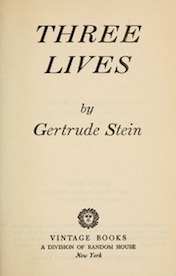
Gertrude Stein’s Three Lives
The circumstances of the blow are so often fortuitous. I read Tolstoy or Proust and say, “Of course.” Greatness as advertised, like the beauty of the Alhambra or the Amalfi coast. Cervantes, certainly, no surprise. And have a helping of Dante or Boccaccio. (I tried to seduce a young lady once through the present of the Decameron, but that doesn’t come under the principle of this collection.) There are texts, and there are times, and sometimes both are right and ring together like Easter changes. (I remember, at Wells Cathedral, the shock of such bells, whose vibrations made me sound.) I didn’t read Stein until my first year in graduate school, and I was ready. No prose ever hit me harder. This was the work of the woman they called “the Mother Goose of Montparnasse”? How could you read the central story, “Melanctha,” and not take everything she did seriously? I read with an excitement that made me nearly ill, and having finished the book at 1:00 a.m. (having never contemplated reading it in the first place, having been lured, suckered, seduced), I immediately began reading it again from the beginning, singing to myself, and moaning, too, because this tension had caused my stomach to hurt quite fiercely. My head also ached. I was sort of sore-eyed. Was this how it felt to have a revelation? Her prose did produce in me some of the same exhilaration that, say, the description of the Great Frost does in Virginia Woolf’s Orlando, and some of the terrible tension I have when, in John Hawkes’s The Lime Twig, Margaret is beaten with the wet rolled-up newspaper; but in addition it produced discovery, amazement, anger (at having been told yet more lies about values by critics and colleagues and teachers). And so, at the end, I was sick, and though hanging over the mouth of the john (where my fears were not confirmed), I knew I had found the woman my work would marry. And I would, in effect, always carry three great faces in my wallet: Virginia Woolf’s, Colette’s, and Gertrude Stein’s. If you ask, like a cinema soldier in a movie foxhole, I will take them out and show them to you.
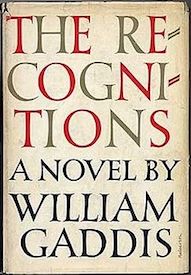
William Gaddis, The Recognitions
It sometimes happens in a writing life that you get lucky, and I have been lucky often. I think that perhaps JR is the greater book, but it hardly matters. The Recognitions was a thunderclap. It was a dull decade, the 50s, but here was a real sound. [I must have been thinking of American literature too exclusively when I wrote this, because no decade could be dull that saw both William Gaddis and Malcolm Lowry appear with major works. Under the Volcano should have been an entry among this 50. Imagine it as the roof. It took me three starts to get into it; my resistance to it is now inexplicable, though I suspect I knew what I was in for. I have never read a book more personally harrowing. It is also a rare thing in modern literature: a real tragedy, with a no-account protagonist to boot. The Consul is one of the most completely realized characters in all of fiction. However, enough of this effort to make up for a shocking omission.] Okay, it was a dull decade. The Recognitions made a real sound. And the 60s would be the novel’s best ten years. But here was Mr. Cranky to accompany Sir Style. Here was a man even madder about the general state of things than I was. Here was a man whose business was seeing through—seeing through bodies, minds, dreams, ideals—Superman was Mr. Magoo by comparison. And here was a man who immediately reminded me of another hero (they can’t all be present), the Viennese culture critic Karl Kraus, because this man collected mankind’s shit, too, and knew where to throw it, and knew where to aim the fan. Then, as affairs would fall out, I had the good fortune to be on the jury that awarded JR the National Book Award, and got a little recognition for an author who, till then, had been the idol of a clique. In time, as it also turned out, I met William Gaddis and became his friend. Thus my third rule was realized: In this business, to have the respect of those whom you respect is the only genuine reward. And that reward is quite enough.
__________________________________
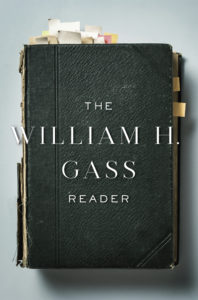
From The William H. Gass Reader. Courtesy of Knopf. Copyright © 2018 by William H. Gass.
William H. Gass
William H. Gass—essayist, novelist, literary critic—was born in Fargo, North Dakota. He is the author of seven works of fiction and nine books of essays, including Life Sentences, A Temple of Texts, and Tests of Time, and was a professor of philosophy at Washington University. He died in 2017. The William H. Gass Reader is available from Knopf.











